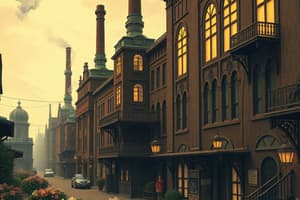Podcast
Questions and Answers
What was the average daily wage of the young girl working in the cotton mill for a year?
What was the average daily wage of the young girl working in the cotton mill for a year?
- 75 cents
- 48 cents (correct)
- 60 cents
- 25 cents
What was one of the main reasons child labor was decreasing towards the end of the period discussed?
What was one of the main reasons child labor was decreasing towards the end of the period discussed?
- Compulsory high school education expanding (correct)
- Higher demand for child workers
- Increase in child wages
- Less families in poverty
What tragedy occurred at the Triangle Shirtwaist Factory?
What tragedy occurred at the Triangle Shirtwaist Factory?
- An explosion injured many employees
- A flood destroyed the factory
- A strike turned violent
- A fire killed 146 people (correct)
What was a consequence of the Triangle Shirtwaist Factory fire in terms of safety regulations?
What was a consequence of the Triangle Shirtwaist Factory fire in terms of safety regulations?
What led to the creation of a federal department for occupational safety?
What led to the creation of a federal department for occupational safety?
What type of work was the family depicted sewing men's pants earning?
What type of work was the family depicted sewing men's pants earning?
What was a common working condition faced by agricultural laborers at this time?
What was a common working condition faced by agricultural laborers at this time?
What major change occurred in the American workforce by 1900 compared to the mid-1800s?
What major change occurred in the American workforce by 1900 compared to the mid-1800s?
Which aspect of the working conditions during the Gilded Age is highlighted?
Which aspect of the working conditions during the Gilded Age is highlighted?
How did wages for male non-farm employees in 1900 compare to today’s standards when adjusted for inflation?
How did wages for male non-farm employees in 1900 compare to today’s standards when adjusted for inflation?
Which groups of workers were primarily employed in factories during the Gilded Age?
Which groups of workers were primarily employed in factories during the Gilded Age?
What was a common feature of the factory work environment during the Gilded Age?
What was a common feature of the factory work environment during the Gilded Age?
What innovative approach characterized the production process during the Second Industrial Revolution?
What innovative approach characterized the production process during the Second Industrial Revolution?
Which of the following statements best describes the living conditions of factory workers in the Gilded Age?
Which of the following statements best describes the living conditions of factory workers in the Gilded Age?
What was a primary source of labor for factories during the Gilded Age?
What was a primary source of labor for factories during the Gilded Age?
Flashcards
Child Labor during Industrial Revolution
Child Labor during Industrial Revolution
Children worked in factories and other industries for low wages and in dangerous conditions.
Triangle Shirtwaist Factory Fire
Triangle Shirtwaist Factory Fire
A devastating industrial disaster in NYC where 146 garment workers, mostly young women, died in a fire in 1911.
Working Conditions - Industrial Revolution
Working Conditions - Industrial Revolution
Long hours, low pay, and dangerous work environments were common in factories during the Industrial Revolution.
Industrial Accidents
Industrial Accidents
Signup and view all the flashcards
Labor Unions
Labor Unions
Signup and view all the flashcards
Child Labor Decrease
Child Labor Decrease
Signup and view all the flashcards
Industrial Revolution's Impact on Middle Class
Industrial Revolution's Impact on Middle Class
Signup and view all the flashcards
Gilded Age
Gilded Age
Signup and view all the flashcards
Industrial Revolution
Industrial Revolution
Signup and view all the flashcards
Factory work (1800s)
Factory work (1800s)
Signup and view all the flashcards
Wage inequality
Wage inequality
Signup and view all the flashcards
Average worker's wage (1900)
Average worker's wage (1900)
Signup and view all the flashcards
Industrial employees (1880)
Industrial employees (1880)
Signup and view all the flashcards
Lack of regulations
Lack of regulations
Signup and view all the flashcards
Second Industrial Revolution
Second Industrial Revolution
Signup and view all the flashcards
Study Notes
The Gilded Age: A Period of Extremes
- The late 1800s in the US was a period of significant economic and social disparity, dubbed the "Gilded Age" by Mark Twain.
- Tycoons amassed immense wealth, while many workers struggled in poverty.
- J.P. Morgan exemplified this disparity, being a key figure in the formation of one of the first billion-dollar corporations.
Industrial Revolution Transformations
- The American economy shifted from agrarian to industrial by 1900.
- The Second Industrial Revolution, spanning roughly from the Civil War to World War I, saw a dramatic increase in factory output due to technological advancements.
- Factories became massive enterprises employing thousands of unskilled workers.
- Automation reduced the need for skilled labor, making worker replacement easier.
Working Conditions
- Industrial workers, especially immigrants, women, and children, faced dire conditions in the 19th century.
- Average wages were low ($483 annually for a male worker in 1900, equivalent to roughly $13,000 today).
- Workdays were often longer than ten hours daily with no paid holidays, and few safety regulations.
- Child labor was rampant, and children were paid far less than adults.
- Factory workers faced significant risks, with thousands killed or injured annually from industrial accidents.
- Employers generally had little liability in industrial accidents.
The Triangle Shirtwaist Factory Fire
- This tragic event highlighted the egregious working conditions of the time.
- On March 25, 1911, a fire broke out at the Triangle Shirtwaist Factory, killing 146 workers, mostly young immigrant women.
- Design flaws, like locked doors and poor evacuation routes, exacerbated the tragedy.
- The fire illuminated the lack of safety regulations and employer responsibility.
- The fire significantly shaped public opinion and sparked changes in labor laws.
Conditions Gradual Improvement
- Reforms to improve working conditions for industrial workers began in the early 20th century, spurred by events like the Triangle Shirtwaist Factory fire.
- Labor unions started forming to increase worker leverage in the mid-1880s.
- Child labor decreased as scientific management and compulsory education increased, although this process occurred gradually.
- White-collar jobs and a growing middle class emerged as part of the Second Industrial Revolution.
Studying That Suits You
Use AI to generate personalized quizzes and flashcards to suit your learning preferences.
Description
Explore the key themes of the Gilded Age and the Industrial Revolution in America. This quiz highlights the economic disparities, the rise of tycoons like J.P. Morgan, and the harsh working conditions faced by many laborers. Test your knowledge on this transformative period in US history.



